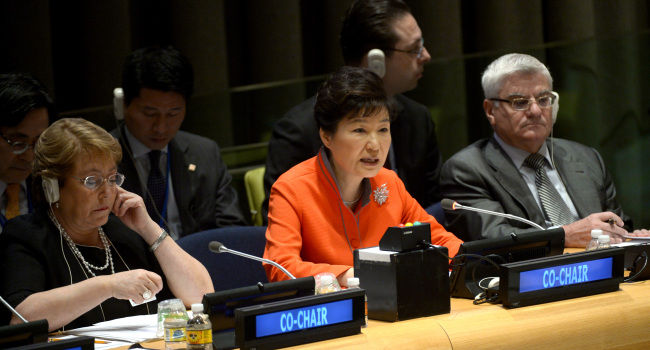President Park Geun-hye Sunday called on countries to carry out their contributions in good faith to ensure a new agreement on climate change can successfully take root.
Each country is required to present its national goal to cut greenhouse gas emissions before the U.N. Climate Change Conference in Paris later this year.
In June, South Korea offered to cut greenhouse gas emissions by 37 percent by 2030 from 850.6 million tons of carbon dioxide equivalents, an amount Seoul says it would reach if it lets business run as usual.
 |
| President Park Geun-hye (center) and her Chilean counterpart Michelle Bachelet (left) co-chair the U.N. Sustainable Development Summit on Sunday. (Yonhap) |
Park said she expects the U.N. member states to produce a new legally binding deal at the Paris conference to cut the heat-trapping gases.
She made her comments at an informal working lunch hosted by U.N. Secretary-General Ban Ki-moon for several countries, including China and France.
The informal working lunch was meant to build momentum in leading up to the Paris conference. Scientists say greenhouse gases are to blame for global warming.
Park also said that South Korea would strengthen the Korean Peninsula‘s capability to deal with climate change as part of efforts to build mutual confidence with North Korea.
She called for the U.N.’s support for her plan, though it remains unclear whether North Korea will cooperate with South Korea in combating climate change.
Earlier Sunday, Park stressed the importance of education in building effective, accountable and inclusive institutions to achieve sustainable development.
Park said South Korea drastically expanded investment in education as it was pushing for industrialization in the 1970s, which in turn created decent jobs and resulted in inclusive growth.
South Korea‘s education fervor helped transform the country into Asia’s fourth-largest economy from the ashes of the 1950-53 Korean War.
Park made her comments at the session on sustainable development. The session was co-presided by Park and her Chilean counterpart, Michelle Bachelet.
Cheong Wa Dae, South Korea‘s presidential office, said the move demonstrated South Korea’s leadership in discussing the major agenda of the international community.
On Friday, member states of the U.N. adopted a new sustainable development agenda and set 2030 as the target year for achieving the goals that call for, among other things, ending poverty, protecting the planet and providing high-quality education.
Park also stressed the importance of the government‘s leadership in setting up an effective and reliable system, citing South Korea’s government-led economic development in the 1960s.
“South Korea has had the experience of achieving industrialization and democracy by getting out of absolute poverty in a generation,” Park said at the session on sustainable development. She also said South Korea‘s experience “can become a useful asset as we are pursuing development goals.”
Park also cited the “Saemaeul Movement,” or new community movement, as an example of building institutions for development.
The initiative — launched by Park’s father, then-President Park Chung-hee, in the 1970s — is credited with helping modernize the then-rural South Korean economy.
Also on Sunday, Park held summit talks with her Pakistani counterpart and proposed that the two sides hold high-level policy consultations later this year to discuss such issues as efforts to rebuild Afghanistan.
Park also held two separate summit talks with her counterparts from Denmark and Nigeria on the sidelines. (Yonhap)

